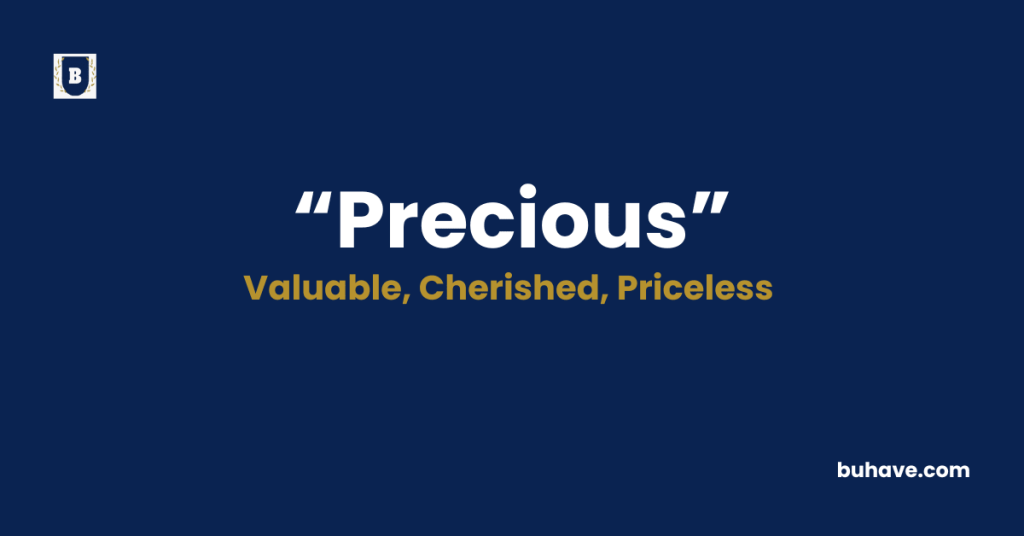The word ‘Precious’ (Adjective) describes something or someone that is highly valued, cherished, or important—often due to rarity, emotional significance, or exceptional quality. In this guide, you’ll learn the full definition, synonyms, antonyms, etymology, and real-life examples of how to use ‘Precious’ correctly in sentences.
Precious Explained in Depth
A complete and detailed guide to the word Precious including meaning, definition, examples, etymology, synonyms, and antonyms.
Meanings of Precious
The word “precious” refers to something that holds immense value—emotionally, materially, or sentimentally. It can describe objects like gold, diamonds, or heirlooms, but it is just as commonly used to describe people, memories, time, or relationships. For example, a family photo from decades ago can be precious not because of its monetary worth but due to the emotional connection it holds. In a broader sense, it can also refer to something that deserves utmost care and attention due to its fragility or limited availability like our time, health, or nature. Overall, the term emphasizes rarity, importance, and deep emotional resonance.
Definition
“Precious” is defined as something or someone of great worth, value, or emotional importance. It often implies that the thing is rare, irreplaceable, or held in deep affection. Precious can describe tangible objects—such as gemstones, family heirlooms, or limited resources—but also intangible aspects like time, love, or wisdom. The word conveys admiration, protection, and emotional connection.
In literature and daily speech, describing something as “precious” elevates it beyond the ordinary. It’s not just good or valuable—it’s uniquely treasured. For instance, calling a child “precious” isn’t about material value but emotional meaning. Similarly, calling your free time “precious” shows it’s rare and meaningful. The term can also carry a tone of delicacy, suggesting the need to handle something with great care.
Etymology
The etymology of the word “precious” has rich and elegant origins, reflecting its current meaning of great value and emotional significance. The word entered Middle English through the Old French term “precieux,” which itself came from the Latin word “pretiosus.”
- Latin root: “Pretiosus” – meaning “of great value” or “costly.”
- From Latin noun: “Pretium” – which translates to “price” or “worth.”
- Over time, its meaning evolved from strictly monetary to encompass emotional and symbolic value as well. Religious texts, for example, would describe a soul as precious or speak of precious virtues, thereby adding spiritual weight to the word’s interpretation.
Interestingly, the shift from “price” to “priceless” in terms of emotional worth adds a deeper layer to the word’s usage today. The word’s Latin and French lineage continues to infuse it with a sense of elegance, reverence, and admiration. Today, “precious” retains its poetic and affectionate tone, making it ideal for expressing deep respect, love, and emotional attachment.
Example Sentences
- The ring passed down from her grandmother is the most precious thing she owns.
- Every moment with his newborn daughter felt precious beyond words.
- Time is a precious resource—use it wisely.
- They shared a precious memory from their childhood that brought tears to their eyes.
- Water is especially precious in desert regions.
Precious Synonyms
- Valuable
- Beloved
- Cherished
- Priceless
- Treasured
- Invaluable
- Rare
- Special
- Adored
- Dear
Precious Antonyms
- Worthless
- Common
- Ordinary
- Cheap
- Unimportant
- Insignificant
- Disposable
- Valueless
- Forgettable
- Trivial
FAQs about Precious
Here are some frequently asked questions (FAQs) about the word “Precious”
1. What does “precious” mean in simple words?
It means something very important, loved, or valuable—either because of its rarity or the emotional feelings attached to it.
2. Can people be described as precious?
Yes, calling someone precious usually means they are deeply loved, cherished, and valued in your life.
3. Is “precious” always about money or material things?
No, while it can describe expensive items, it’s more often used to talk about things or people that are emotionally meaningful.
4. What are some examples of precious things in life?
Family, health, time, love, memories, friendships, and personal keepsakes are often considered precious.
5. Is it okay to call an adult “precious”?
It depends on the tone and context. In affectionate or poetic language, yes—but in professional settings, it might sound overly sentimental.
6. Does “precious” always mean positive?
Yes, it generally has a very positive, warm, and affectionate connotation.

















